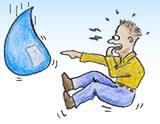
Ban the thing, NOW!!
Want to Join the Club?
When the news broke, it gave rise to an instant wave of condemnation. A thoroughly hazardous substance, dihydrogen monoxide (DHMO), is being used in a myriad industrial processes, as a cleaning agent for agricultural produce and even as an ingredient in baby food. Known for corroding metal, being the main component of acid rain, a key component of certain bombs, the cause of major environmental disasters, a contributor to the greenhouse effect, and whose inhalation even in small amounts can lead to death and exposure of skin to its gaseous form can cause hideous damage, it is nonetheless available to anyone wishing to pay for it. Even children.
Polls among those given information on its nefarious effects have shown overwhelming support for banning it. Even some politicians have expressed outrage, showing unusual courage in the face of the massive industrial resistance such a ban would elicit.
And yet, dihydrogen monoxide is just another name for water (“two-hydrogen one-oxygen”). So much for expressing outrage at things you haven't bothered to look more closely into.
But that is exactly what some politicians and journalists are leading the German citizenry to believe about fracking. Spooked by a documentary film (which has been debunked in the meantime) and by much hype regarding the perils posed by this new form of gas extraction, Germans are dead against permitting it anywhere in the country. Some politicians, true to form, seeking to burnish their people-caring and environmental credentials, have huffed and puffed and vowed to erect such legal barriers against fracking as to make it practically impossible.
Why bother? Do we need fracking at all? Actually, yes. For one thing, Germany is trying to achieve the Energiewende, its vaunted energy transformation to wean itself from both fossil and nuclear fuels and rely on renewables: fracking would provide a useful bridge between the decommissioning of Germany’s nuclear plants and fuller development of the renewable alternatives. For another, it would diminish the country’s dependence on Russian gas, reducing one of Germany’s most awkward geopolitical constraints.
So, what are the real facts of fracking?
First off, it is not new. Neither in the US (65 years old) nor in Germany itself (half a century). None of the 350 fracking operations to date in Germany has caused any environmental damage. In the US, only a handful of mishaps have been recorded out of more than two million operations, and only because the most elementary precautions were disregarded. Such operations would have never been possible under German regulations.
But what about that freakish faucet spouting flames shown in the documentary? As it happens, that phenomenon, caused by methane contained in the water, had been observed in the area in question since the 1930s, well before fracking was invented. The methane appears to have seeped into the water by natural processes quite a long time ago, and its origin was demonstrated to be biological not thermogenic (i.e. it is unrelated to gas extraction). The documentary author chose to disregard this fact because, in his view, it was "not relevant".
Does this mean that fracking poses no risk to drinking water? Correct. Done properly, i.e. in accordance with regulations in force, such risk can be ruled out. Hans-Joachim Kümpel, chief of Germany’s Federal Institute for Geosciences, in a recent interview with the German daily Handelsblatt pointed out that fracking is carried out at depths well beyond 1,000 meters, far deeper than the water table. Furthermore, what water is found at that depth is not exactly pristine, as commonly assumed: it contains about 20 to 30 percent salts (by comparison, seawater contains only about 3.5%), heavy metals and other stuff. The fracking fluid is pretty 'clean' in contrast, consisting of water with less than 2% chemicals, mainly aimed at lubricating and preventing pipe corrosion. (The problem, of course, is that the word "chemicals" is another of those terms that turn Germans livid.)
It is still true that careful tests must be conducted in densely populated areas, to check whether everything works as advertised and no subsidence problems occur. But, if it were up to the general public, not even testing should be permitted.
All 16 geological services in Germany, as well as all those in the EU — which no one could accuse of being in the pocket of energy companies — agree that there are no scientific facts to warrant the level of fear evident among the population. But Germans in particular are not quick to let anything get in the way of their anger.
From politicians and journalists, however, given the role that they play in enacting legislation and shaping public opinion, respectively, one would expect at least a passable acquaintance with the relevant scientific facts before they start railing. Alas, many have chosen to join the DHMO club instead.
